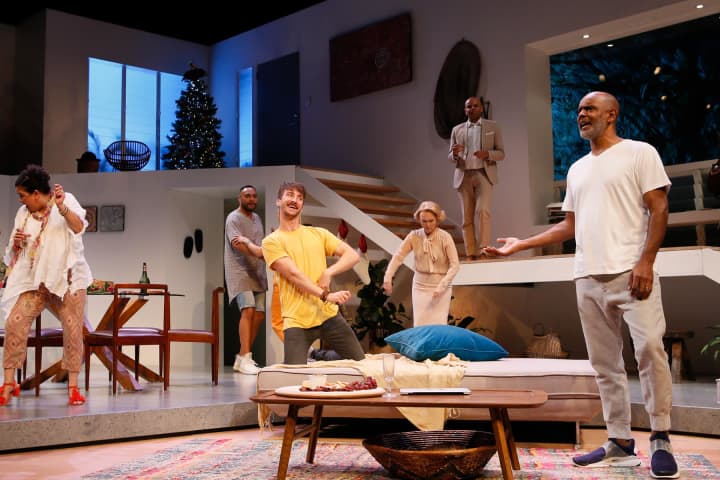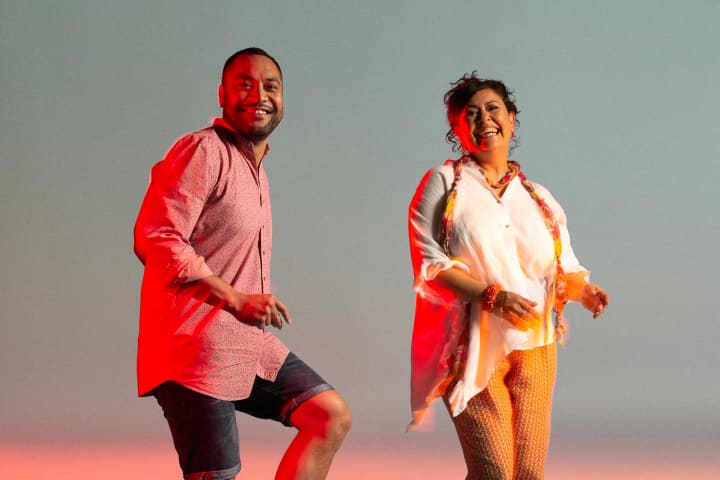Nakkiah Lui is a writer, actor and director with a lot on her plate. She is the co-writer and star of popular ABC TV shows Black Comedy and Kiki and Kitty, a regular columnist for the Australian Women’s Weekly, a podcast co-host for Buzzfeed’s Pretty for an Aboriginal, and is working on a novel for Allen & Unwin, as well as her first feature film.
In the last two years, Lui’s plays Blackie Blackie Brown and Black is the New White (which collected her the New South Wales Premier’s Literary Award) were staged in three states and she directed an Australian reimagining of Branden Jacobs-Jenkins’s play, An Octoroon. And this October, Black is the New White arrives in Melbourne after touring the country. Earlier this year, the world premiere of her play How to Rule the World opened in Sydney. Lui is busy, to say the least.
Born in 1991, at a time when Australian TVs, cinema screens and stages rarely depicted the country’s First Nations population, Lui has been instrumental in amplifying the representation of First Nations people into popular culture throughout her career.
When Lui completed her law degree six years ago, she picked up the inaugural Dreaming Award from the Australia Council for the Arts, as well as the Balnaves Foundation Indigenous Playwright’s Award. Both prizes were worth $20,000, putting Lui in good stead to start her writing career. However, it was by answering an ad from the ABC’s then Head of Indigenous, Sally Riley, who was seeking writers for Black Comedy, that Lui’s network of creative collaborators broadened and her career began to flourish.
Her play Black is the New White opened to widespread acclaim at Sydney Theatre Company in 2017, demanding a second season for itself in 2018. It then went on to play in Brisbane, Wollongong, Parramatta and Canberra where it attracted more rave reviews and rapturous audiences. In Lui’s play, there is a love story, a plethora of racial politics, and an overarching enquiry into how Aboriginal lives are portrayed in contemporary storytelling. Such is the success of Lui’s play that in 2019, it was awarded another three seasons, and will open to new audiences at Melbourne Theatre Company, Perth’s Black Swan State Theatre Company and the State Theatre Company of South Australia.
‘Black is the New White started as two separate conversations,’ Lui says. ‘I had a conversation with a cousin of mine who is this fabulous young Aboriginal woman, a gorgeous and great mum, and we were talking about her racial/political beliefs that were akin to black separatism. I didn’t agree with her, but I thought it was a really interesting conversation to be having with someone who, I would say, is part of this new emerging Aboriginal middle class.’ It was around this time Lui looked at the Census and discovered a surprising statistic: 74% of Aboriginal people who got married, married non-Aboriginal people. ‘I found this really interesting … it intrigued me as to who this 74% are.’
It was a fact that led Lui to investigate how her own family had shifted over the last two generations, and how this had affected their definition of class. ‘I was really interested in how we identify ourselves in terms of our racial and cultural backgrounds. And how that intersects with class. What does it mean to be successful? Especially as Aboriginal people when you come from a community that is so often politicised.’
‘I also wanted to present a family of Aboriginal people that hasn’t been seen before, I wouldn’t just say on stage, but within the Australian canon of work across different platforms; and that is an Aboriginal family who have money, who are not necessarily oppressed but are culturally quite strong. So I had that idea of wanting to put that family forth because for me, that was similar to what I’ve grown up with.’
Lui says she’s watched her parents transform into serious foodies over the last 10 years. ‘They’re really into their food and wine,’ she says, which inspired her to present a family of Aboriginal people drinking on stage in a way that wasn’t politicised. ‘I think that in and of itself becomes a statement. So I wanted to put that forward, and say “Here’s a family who are like you”. I wanted to write something that didn’t come from a place of sorrow, or from death, or from oppression; where you’d have to rehash that intergenerational trauma. This was actually about something that had hope and happiness in it.’
Black is the New White is indeed a play about class and race, but above all that, it’s just about people, Lui says. ‘It’s about people who are in flux and have to accept change in their lives.’
Black is the New White is playing at Southbank Theatre from 2 October until 9 November.
Published on 5 September 2019





